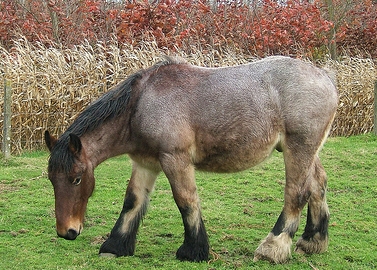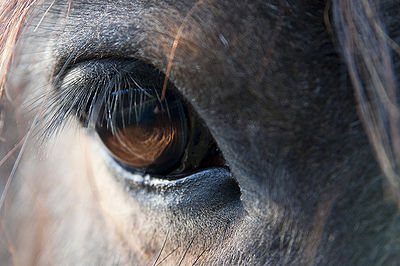Horses breathe only through their noses. The belief is that this may prevent dust, dirt and other debris from getting into the lungs. Due to their large size, horses only inhale while the front legs are in stride, not when the legs land. Their lungs do not expand enough to allow oxygen in due to […]
Horse Health
Owning a horse is a commitment to take care of all needs. It’s up to every horse owner and horse lover to ensure their health and well-being. We hope these articles help you keep your horse in the pink. Please remember that these articles are not meant as substitutes for your veterinarian. If your horse is ill, please see your vet asap.
Here’s the list!

Feeding a Horse During Droughts
Drought conditions sometimes occur, but can be predicted. You can prepare your horse beforehand by helping him/her to adjust gradually. Before pastures dry and prices of hay rise, stock up on quality hay. Purchasing hay by the ton means you’re getting the right weight for the price you pay. If you buy bales, try to […]

Excessive Drooling in Horses
You know what cats say: “Dogs drool and cats rule.” Drooling is far from the prettiest sight, but most of the time, in dogs, particularly certain breeds, it’s perfectly normal. However excessive hypersalivation (drooling) in horses can be a symptom of a serious condition. Horses have 3 pairs of salivary glands – parotid, sublingual and […]

What’s New in Equine Ophthalmology
Researchers have discovered that a horse’s behavior can be affected by its eyesight. Sight problems can cause difficulties with training and can even cause a horse to spook as well as have other unwanted behaviors. Cataracts can occur at any age in horses. The lens of the eye becomes clouded and appears milky-white, causing sensitivity […]

EIPH in Horses
EIPH is the acronym for exercise-induced pulmonary hemorrhage, a vascular bleeding problem occurring in the lungs. Generally, EIPH is a condition affecting racehorses. Fortunately, most horses with EIPH appear not to suffer ill effects from the condition. However, those horses that experience severe bleeding can have permanent lung damage. When a horse inhales oxygen, carbon […]

Detection of Selenium Toxicity in Horses
Selenium is a trace mineral that is necessary for the way a horse functions. It acts in conjunction with Vitamin E as anti-oxidants, protecting cell membranes from destruction. However, too much or too little selenium can have adverse effects. A deficiency of selenium can cause muscle disease, impaired heart function, difficulty swallowing, respiratory distress and […]

Basic Physical Exam for Horses
Do you know what to do when your horse isn’t feeling tip-top? Before you call your veterinarian, you should be armed with information that will help determine the seriousness of the problem. The basics of a physical examination include temperature, pulse rate and respiration as well as observation of any outward signs the horse may […]

Equine Vaccine Reactions
Vaccines are crucial to horses’ health, keeping them disease-free. However side effects, although not common, can occur. After vaccination, a horse may experience achiness and a slight fever, swelling at the injection site, soreness in the neck area. These effects usually abate in a couple of days. Some horses can have severe reactions to vaccinations, […]

Equine Tooth Resorption Linked to a Bacteria
Research, headed by Dr. Sabine Sykora, PhD, of the Equine Clinic, University of Veterinary Medicine, Vienna, Austria, has found a red complex bacteria present in the early stages of EOTRH – Equine Odontoclastic Tooth Resorption andd Hypercementosis. EOTRH is most commonly seen in horses 15 years and older. The bacteria, designated as red, is part […]

Culicoides in Horses
The Culicoides midge is a tiny gnat, also known as no-see-ums because of their size. Their bite causes “sweet itch”, an allergic skin reaction. The itch occurs when these tiny gnats bite a horse who is sensitive to the gnats’ saliva. The itch is so intense that the horse will rub the area, developing sores […]
